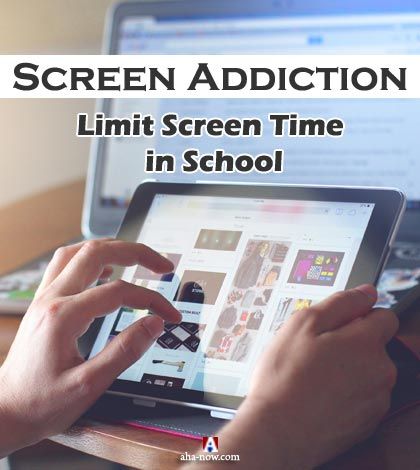Screen Addiction: Limiting Technology in School Helps Children

Table of Contents
- Children of Internet Culture
- How Technology Affects Children
- Effective Uses of Classroom Technology
- Children with Disabilities
- So What’s the Problem?
- Addicted to Electronics
- Screen Addiction Stunts Children’s Brain Growth
- Preventing Excessive Screen Time and Reducing Addiction at School
- Protecting Children from Screen Addiction
Screen addiction in children is a challenge. In this digital age, what can we do to reduce the screen time of our kids. Know all about screen addiction and if limiting the screen time of children in school helps deal with the problem in this post. ~ Ed.
Screen addiction in children is a growing concern.
Psychologists treat clients for internet and screen addiction in counseling, outpatient therapy, and rehab centers.
Psychiatrists debate the nature of excessive screen time in children and whether it should be officially classified as a compulsion or addiction.
Parents worry their children are spending too much time engaged face first into smartphones and tablets. And schools are adapting with the times and incorporating the use of technology into their classrooms.
Amid all the debates and worries, where does the balance lie in effectively using technology in school while still limiting students’ screen time in a healthy way?
Children of Internet Culture
Screens and media are an unavoidable part of a child’s life. Exposure is widespread at home, school, with friends, and even on the streets as digitalized billboards and menus pop up everywhere.
And since innovative technology will only amplify, our children will grow up and likely use technology in their workplaces. So it follows, they must learn to use up-to-date electronics to thrive.
Excessive time spent on TV, video games and computers, however, will deprive them of imaginative play, exercise, book reading, and other activities. These activities allow their brains to develop the other necessary skills to thrive in their world.
With excessive screen time – like addiction – side effects occur, some bearing serious risks. Limits are needed. Young minds need guidance.
But we are all familiar with the amazing enhancements cyber culture has brought to our lives. There are benefits to using electronic devices, and it would be unrealistic to deny them to our kids entirely.
Schools nationwide incorporate the use of tablets and the Internet into their curriculum. However, some addiction specialists fear this is more harmful than helpful to students.
By exploring the good, the bad and the ugly research data, we can implement an effective use of screen time and appropriate limits in educational settings for our children.
How Technology Affects Children
There are both benefits and detriments to children using technology. Many professional research studies illuminate the effects of screen time on kids.
In simplified terms, the scientific research identifies changes in the way young users are learning and developing because of electronics.
Whether digital media helps or hinders a child depends on several factors, chiefly:
- The age of the child when first introduced to electronics.
- The length of time spent on screen per day.
- The type of devices used.
- The kind information is accessed.
The long-term effects of technology on the brain are still a relatively new area of study. So, it is hard to know what all the repercussions and impact on the younger generation will be.
But we do know the use of the internet is changing the way we think. And for children, whose minds are malleable and developing, frequent exposure to technology is wiring their brains in different ways than previous generations.
The internet encourages our brains to scan information quickly and efficiently.
Effective Uses of Classroom Technology
Instead of having to remember as much information or study by rote, children are learning how to find answers via search engines.
It may free up space for more important memory or higher-level thinking. Also, it may produce more adept learners and effective students.
Online games for math and spelling tutorials teach kids faster and a greater amount of knowledge than paper and pencil quizzes and study guides. Plus, kids enjoy them more, and fostering an enjoyment of learning is invaluable.
Research has shown that screen media use improves reaction time and visual-spatial capabilities.
Children with Disabilities
Of note, classroom technology can be especially helpful to children with disabilities.
Specialized tablets can vocalize ideas when tapped on by students who can’t speak well or put their thoughts into words. This type of device can be life changing for a child who was frustrated by the inability to communicate.
Children who struggle with confusion and self-expression benefit from games that involve piecing together concepts in a visual way. Autistic children who use virtual reality training show a boost in cognition and social skills.
Parents of children with disabilities report their children to be calmer and more communicative while using interactive devices. Special education teachers report similar findings.
So What’s the Problem?
Well, bully, sexting, and online predators — to start.
Research studies have shown several negative effects of kids using screen time, the more hours per day, the worse the symptoms. Decreased attention span, decreased memory abilities and decreased the ability for concentration are common effects.
Young people are particularly susceptible to wanting the immediate gratification of learning a story in a 6 minute YouTube video instead of reading a 300-page book.
In past generations when children spent more time reading, our brains were wired to think with sustained attention and focus, skills associated with memory and creativity. TV and the internet require kids to use less imagination and concentration.
Distraction becomes the norm and critical reasoning skills, problem solving, and decision making are no longer required.
It is interesting to wonder if there is a connection between the sharp increase in A.D.H.D. cases in children over the years and the rise of excessive interactive screen time.
One study reported that children who used over 4 hours of screen time per day had less sense of well-being than those who used less or none. Too much screen time causes mild depression, impulsivity, and moodiness.
Additionally, scientists have found childhood obesity is on the rise. It is not only because of the type and amount of food eaten but also due to the rise of technology, which encourages a more sedentary lifestyle and poor sleep habits.
Children who spend too much time on electronics are losing important social skills in empathy as well.
UCLA did a study of 6th graders’ ability to properly read facial emotions in photos and videos of people. The researchers proved that kids who took a 5-day break from using devices had a higher ability to correctly identify feelings and emotions and show empathy.
Addicted to Electronics
Common Sense Media recently published a study reporting that half of all young people feel they are addicted to their devices, and sixty percent of parents think their kids are addicted.
There was great debate as to whether to include Internet addiction as a disorder in the DSM-V. Although it was omitted, the debate continues. And many people with internet or screen addiction are at significant risk and merit the care of a professional rehab center.
Internet use becomes addictive or compulsive behavior when the person continues to use despite harmful consequences and interference of personal, social, or occupational responsibilities.
Behavior addictions, like substance addictions, result in the release of dopamine (the feel-good chemical) in the brain. In a study using PET scans of the brain while gamers played video games, dopamine was found to be released during play.
Another study found serotonin (another feel-good brain chemical) was released in teen boys with excessive internet use. They also scored higher on the Beck Depression Inventory and harm avoidance tests—two factors predisposing people to addiction risk.
These chemical reactions in the brain are part of what influence psychiatrists to find correlations with the excessive use of electronics and similar responses in substance use.
Addiction experts can’t yet agree on the appropriate diagnostic criteria for identifying other behavioral addictions, such as the Internet and gaming addiction, not yet included in the DSM-V.
But evidence is mounting in support of standardizing a diagnosable addiction. Many reputable individual, group, and rehab center treatment options are also available.
Screen Addiction Stunts Children’s Brain Growth
Brain imaging studies have found atrophy in gray matter in the brains of internet-addicted participants, as well as several other disconcerting brain changes.
This means internet or screen addiction causes damage in the brain’s frontal cortex. It is the crucial part of the brain which carries out the higher mental processes. It undergoes massive changes and is still developing between puberty and the mid-twenties.
Not only do behavior addiction activities release the feel-good chemicals that also trigger in substance use disorder, but experts also find that cravings and urges for video games produce brain changes similar to those of drug cravings.
One of the country’s most forefront addiction experts, comments that these parallels on the brain (drugs and screen use) impacts a child both neurologically and clinically in the same way a drug does. He recommends not exposing kids under the age of 10 to smartphones or tablets.
Preventing Excessive Screen Time and Reducing Addiction at School
Environment plays a huge role in human development. Schools and educators have a big responsibility in this way. Introducing screen time at too young age can be more harmful than helpful.
Schools can limit the use of technology to computers and laptops for research and writing purposes. They can disallow elementary students to bring phones and tablets to school for recess use.
Instead, they can encourage more book reading. When children must use focused attention in book reading, their brains develop in stronger ways.
As in all good things, moderation is key. Even older children should not have unlimited time on electronics at school.
If education involves internet use, educators should teach responsible use and monitor for signs of addiction. Many teenagers have had to be hospitalized for gaming or internet addiction.
Video presentations and free computer time is no substitute for lectures.
Schools can implement software programs to block YouTube, Facebook, Instagram, and any other sites where they find age inappropriate material, and any sites that are solely “fun” sites with no educational value.
Protecting Children from Screen Addiction
Whisking a child away to a protective techno-free bubble might shield them from the potentially negative effects of screen use, but it will not prepare them to function as successful independent adults in the age of technology.
However, parents and educators can teach children how to use internet technology as a skillful tool.
Over to you –
Are you in favor of limiting the screen time of children to help them keep away from screen addiction? Share in the comments.
Disclaimer: Though the views expressed are of the author’s own, this article has been checked for its authenticity of information and resource links provided for a better and deeper understanding of the subject matter. However, you're suggested to make your diligent research and consult subject experts to decide what is best for you. If you spot any factual errors, spelling, or grammatical mistakes in the article, please report at [email protected]. Thanks.











This is something that everyone find natural yet is scary enough. From my personal experience, my niece who is hardly 2 years old never drinks milk without watching rhymes/cartoons from YouTube via her mother’s smartphone.
This is indeed a cause for concern.
For some peace, parents hand devices over to children to keep them quiet. This doesn’t just affect the relation between parent and child, the results of which become visible during the latter’s adolescence. It also affects children’s life skills. Children develop better cognition, but lose out on skills to solve problems and handle life.
I think the solution to this problem is not just to get kids away from screens, but for parents to get away from them too.
Hi maam,
This is something that everyone find natural yet is scary enough. From my personal experience, my niece who is hardly 2 years old never drinks milk without watching rhymes/cartoons from YouTube via her mother’s smartphone.
So yes this is really scary as to what these kids will be addicted to when they grow up.
You sure have to take preventive measures.
-Swadhin